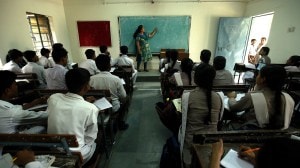Poll Violation, Twice Over
...

By the BJP8217;s own admission, the woman is not just a rape victim, as if it is possible to be just a rape victim. She is, senior leaders of the party still claim without a trace of remorse, a symbol, called to the dais to stand in for the allegedly 180,000 victims of sexual offences in the 10 years of the Digvijay Singh administration in Madhya Pradesh.
Certainly even in a state that routinely witnesses numbing violence, her case stands out. It dates back to the summer of 1994 in the village of Chuvarliya, Rajgarh district. According to the government inquiry report submitted to the Vidhan Sabha, it all happened after the victim8217;s husband, a Dalit, earned the local sarpanch8217;s wrath.
The husband was dragged from his fields, tied to an electric pole and beaten to death in the presence of his wife. The whole village stood and watched. She was molested, stripped naked and paraded through the village. She was then taken to the sarpanch8217;s house where she was urinated upon and raped.
The inquiry also recommended a case against the police. After the incident the villagers, terrified of the sarpanch, fled. The police duly arrived and stole silver from the abandoned houses, finally extorting money to let the villagers return.
IT was perhaps to repair an image battered by reports such as these that the police held a press conference in August to highlight its commitment to the rights of women.
|
|
|
Digvijay Singh scored a point when he accused the BJP of paying Rs 1 lakh to the Rajgarh case victim. But he also scored a huge self-goal by seeming to protect those civil servants and politicians implicated in the lurid 8216;serial-rape8217; casen |
|
|
The Bhopal SP, Arun Pratap Singh, paraded a journalist, S.S. Asthana, before the assembled media. He pointed to the prompt arrest of the accused after a schoolteacher complained of sexual exploitation over a period of several years.
A month later the school teacher went public with allegations that Asthana had forced her to have sexual relations with several retired and serving IAS and Forest Service officers.
An inquiry by the National Commission of Women NCW concluded, 8216;8216;The victim could not resist. She was threatened that if she complained to anyone about the sexual assault then her nude photographs would be published 8230;
8216;8216;Under fear, she was made to accede to his repeated demands. In that process she was introduced and offered for being sexually exploited to other accused persons who were all well known to Asthana 8230;
8216;8216;She was asked 8230; why the names of the other accused were not disclosed by her to the police 8230; she explained that other accused were influential officers 8230;
8216;8216;However, later, on considering the conduct, behaviour and activities of other accused persons who were out to defame the victim, she decided that her suffering had reached a peak and that she must reveal the names.8217;8217;
|
|
|
Uma Bharti presented the woman at the prime minister8217;s rally, but denied she had identified her as a rape victim. The BJP, foot firmly in mouth, admitted it had put Rs 1 lakh into the victim8217;s bank account, but denied this was a political move |
|
|
NEITHER case deals with issues that can be made light of. In both, subsequent developments have reflected badly on the very people who have sought publicity at the expense of the victims. In some measure the two events also encapsulate the problem the Madhya Pradesh voter faces in election 2003.
Since the rally, the BJP has been on the defensive over the presence of the rape victim on the dais. Moments after she left, the prime minister got up to give what should have been one of the more memorable speeches of this campaign.
For a few days it forced Digvijay onto the defensive. For a few days it forced both the Congress and the BJP to speak about roads and power supply, or the lack thereof, in the state.
But already human rights groups were expressing outrage at this attempt to extract public mileage out of rape. And then it got worse. Digvijay has always known that the best way to counter criticism is to deflect it, and the BJP gave him a readymade opportunity.
At a press conference just days after the rally, he accused the BJP of depositing Rs 1 lakh in a bank account in the victim8217;s name to ensure her presence on stage. The BJP admitted the money had been deposited but denied this was politically motivated.
BJP chief ministerial aspirant Uma Bharti8217;s defence only made things worse. She said she had not identified the woman as a rape victim at the rally. She charged Congress leaders with besmirching the hapless Dalit8217;s reputation by their use of the term 8216;8216;rape8217;8217;.
There was just one problem. The BJP8217;s own charge sheet 8212; 8216;8216;Apradhon ka saikda paar, das saal ka bantadhar8217;8217; 8212; states under the section titled 8216;8216;Mahila utpidan mein pradesh ko desh mein no 1 banane wali nirlajj sarkar8217;8217; that the victim was paraded naked through Chuvarliya village in Digvijay8217;s former constituency, Rajgarh, and then raped.
Uma claimed she was not aware this had been cited in her own charge sheet against Digvijay!
Even the most charitable interpretation of the episode has left the voter faced with the prospect of a chief ministerial candidate who is her own worst enemy. Who has through her own doings ensured the attention strays every time the campaign threatens to focus on the failings of Digvijay raj.
IT is not an easy quandary for the voter. The Bhopal police8217;s subsequent actions in the second case illustrate why there is no groundswell for a third term for Digvijay either.
Once the names of senior bureaucrats surfaced, the same SP who has never shirked from hogging the media limelight now wants to have nothing to do with the case, 8216;8216;We have not received the NCW report. We have read the names in the media but where is the evidence? Even the chairman of the NCW was convinced that this woman had added the names later.
8216;8216;Instead of falsely allegating sic names of officers she should have come to us. She should give us evidence, or she could have just sent a registered letter to us. She is an educated woman and we can only go by her written statement.8217;8217;
Quite apart from the fact that her written complaint was received and acknowledged by the chief minister8217;s office, the SP8217;s claim is contradicted by his own subordinate, investigation officer Usha Tewari.
8216;8216;We have already presented the challan against Asthana,8217;8217; Tewari says, 8216;8216;we have details regarding stay at hotels and guest houses which tally with what the victim has told us.8217;8217; Asked about the officers named by the complainant, Tewari hedged but finally admitted, 8216;8216;Yes she has named these officers before us. I have written to the DDP deputy director. prosecution seeking legal advice.8217;8217;
FOR the voters of Madhya Pradesh, this is a familiar pattern. An administration quick to hype minor achievements and extract as much publicity as possible. But when it comes to delivering on the ground, nothing really happens.
Digvijay8217;s response also has been typical. Despite an indictment of his officials by a constitutional body, the NCW, he has preferred to look the other way.
It is an approach he has adopted often enough 8212; when ministers were indicted by the lokayukta, when senior bureaucrats found themselves mired in corruption cases. Unsurprisingly, one of those indicted by the NCW still continues to be a Congress spokesperson in the state.
|
8230; And an incident in Rajgarh
|
|
The very day Digvijay Singh held a press conference alleging Rs 1 lakh was paid to the victim to appear on stage, she was brought to Bhopal. At first, people close to Uma Bharti said the victim would address the media. Meanwhile, for an entire day the BJP state HQ was unable to locate former MLA Raghunandan Sharma, said to have arranged the Rs 1 lakh bank deposit. Story continues below this ad Confusion surrounded the victim8217;s presence in Bhopal. Finally chosen journalists met her at the residence of the BJP mahila wing chief. Subsequent efforts to meet the victim were unsuccessful, with BJP leaders claiming she was away but would be back in her village soon. 8216;8216;8216;Uma Bharti came to meet me in the village shortly after the incident. She had then told me that if I ever needed any help I should approach her. I first obtained Rs 25,000 from the government at Uma8217;s intervention. 8216;8216;I have one acre of land that did not yield a crop due to the drought. I had to feed myself by working as a labourer. My goats were stolen, and now I lost my buffalo. 8216;8216;I had nothing to eat so I came to Uma Bharti for help and she helped me. Former MLA Raghunandan Sharma and sarpanch Ramnarayan Sharma came to me to deposit the money in the bank.8217;8217; . |
|
Bhopal8217;s VIP guilt 8230;
|
|
The NCW inquiry concluded that 8216;8216;from the depositions it appears that a reasonable case has been made of sex exploitation against accused Vidhan Chandra a serving Forest Service officer, Mr Dahima Man Dahima, retired IAS officer and currently Congress spokesperson and Mr Bhagat a retired IAS officer.8217;8217; Their depositions before the NCW follows Asthana: 8216;8216;She the victim has reported against me because she wanted the premises of my house for running tutorial classes but in that portion tutorial classes are already being run by one brother and sister. The lady who is running the tutorials also needs my help.8217;8217; Man Dahima: 8216;8216;The victim is deposing against me under a larger conspiracy. Firstly, as she is not happy with my relationship with Mr Asthana and secondly, she wanted to settle some problem with Mr Asthana for which a request was made to me and I refused to intervene.8217;8217; D.R. Bhagat: 8216;8216;I had attended many public functions, maybe the victim may have seen me in some function. So she can identify me. But I don8217;t know her and I have not seen her 8230; The victim is making allegations against me under a conspiracy.8217;8217; Vidhan Chandra: 8216;8216;I cannot say why the victim is making allegations against me. Since I do not know any reason. Asthana has not been my friend 8230; I had gone to Mr Asthana8217;s house and lastly I went to his house when his wife had died 8230; I know that Asthana had illicit relations with the victim.8217;8217; |
- 01
- 02
- 03
- 04
- 05































